Peter MALONE
Robin Williams: Come Inside My Mind
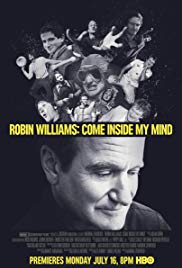
ROBIN WILLIAMS: COME INSIDE MY MIND
US, 2018, 116 minutes, Colour.
Directed by Marina Zenovich.
The mind in the title of this documentary is that of comic performer, often manic, Robin Williams. It was made in the immediate years after Williams' suicide. It is a memoir. It is a tribute.
As with any documentary like this, the impact depends on audience interest in, knowledge of the subject's life and career. Williams was very well known from television, Mork and Mindi, as well as a range of films like Good Morning, Vietnam with its comic intensity or Awakenings with his portrait of Dr Oliver Sacks.
As with any good portrait, the film is able to fill in a great deal of Robin Williams' background, what he was like as a boy, his comic talent, his relationship with his parents. But, as with someone so intense in life as Williams, even with his pace of talking, the flood of ideas, there is the expected lack of self-confidence, and reliance on alcohol and drugs, success and failure in relationships with wives and children. The film charts the course of the intensity of his life leading to his death.
Of great interest is the range of talking heads, different perspectives on the experience of Williams as a person and as a performer.
Then, there is a range of clips from television and from the many films he made.
Williams gave a great deal of pleasure to audiences with his performances, his comic insights, his wit, often the unexpected. During his life and his career, many might have wondered about the verve and atmosphere of his mind. Here is an opportunity to come into his mind.
1. A documentary portrait of Robin Williams? The title and the focus on the mind?
2. The perspective of his death, the pathos, the interpretation of his life and career in that light?
3. A film requesting understanding, empathy, creating the puzzle of the mind of Robin Williams?
4. His life portrait, the details, his career, the driving forces?
5. His background, his relationship with his parents, his mother, the absent father, the half-brother and the interviews? At school, his talents? The comedy emerging?
6. The range of talking heads, the selection of clips, as illustrating not only his career but his personality? The range of interviewees, his son, his wives, close friends, the professional world, Billy Crystal?
7. The momentum of his life and career, his mind, words, working fast, images, the manic touch, word associations, images, humour, his skill and entertaining?
8. The world of stand-up, his being clever, quick-witted, themes, engaging his audience, energised by the audience, no limits? Whoopi Goldberg and Billy Crystal and the social humour? The sexual humour?
9. Mork and Mindy, the introduction to television, his zany approach, Pam Dawber and the interviews? After some decades?
10. His going into the movies, the range of films, the scenes showing Dead Poets Society, Good Morning, Vietnam? By 1980? The episodes from Awakenings and his being with Oliver Sacks?
11. Drugtaking, alcohol? The effect on his relationships, with his wives, with his son? Alcohol and the AA meetings? His analyses of his condition? The effect, getting clean, divorces?
12. The time of his peak, his later years and past his peak, his continuing skills and their effect? Being dry? The third marriage? Depression? The
signals for his suicide?
13. A talented and gifted comic and the repercussions on his life?
Meyerowitz Stories (New and Old), The
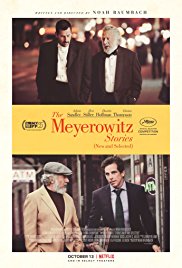
THE MEYEROWITZ STORIES (NEW AND SELECTED)
US, 2017, 112 minutes, Colour.
Adam Sandler, Ben Stiller, Dustin Hoffman, Emma Thompson, Candice Bergen, Judd Hirsch, Grace Van Patten, Ronald Alexander Peet, Elizabeth Marvell, Rebecca Miller, Adam Driver, Sigourney Weaver.
Directed by Noah Baumbach.
An episodic film, selected stories of dysfunctional families, especially Jewish families and those living in New York City. It was written and directed by Noah Baumbach who made a number of striking films on similar themes, The Squid and the Whale, Margot at the Wedding, Mistress America and Frances Ha, with (Greta Gerwig), and Greenberg with Ben Stiller.
While there is a great deal of variety and humour in this story of families, parents and children, rival brothers, plenty of eccentric characters, the cast is quite striking. Dustin Hoffman appears as the father, ageing, coming to terms with life. There is a surprise in finding Emma Thompson in New York City as his wife. The two sons are quite different, each different in his acting and comic style, the contrast between Adam Sandler and Ben Stiller. And, there is a very strong supporting cast.
Some audiences might find these stories to New York focused, a difficult immersion in the fights and squabbles of Jewish families. But, as with all of Baumbach’s films, often arresting.
1. Family stories? Dysfunctional families? In several generations? Parents and carers? Children and grandchildren? The effects, long-term, the ability to cope, possible remedies, possible changes in reconciliation?
2. American Jewish families, audience expectations of stories about them, characters, interactions, talk, the effect? Marriage, divorce, favourites, neglect, through the generations and the consequences?
3. The director, his themes, his strong cast?
4. The New York story, the city, apartments, museums and galleries, the social atmosphere, restaurants, the streets, hospitals? The musical score?
5. The chapters, the focus on particular characters and events?
6. Adam Sandler as Danny, his age, his relationship with Eliza, his wife, Karen, leaving him? Eliza going to college? Her work on filmmaking, starring herself, schools, the sexual emphases? Driving in New York, Danny and his yelling out, Eliza in the car? Looking for a parking spot, passing them? The importance of the visit to his father? Hoping to stay with him? Memories of his mother, the divorce? Julia as stepmother, mother of Matthew? Maureen and her role with his father? His relationship with Jean, her life? Maureen and her travel, drinking, absence, discussions, the art, the pieces, the exhibitions? Danny as a musician, composer? The issue of the selling the house?
7. LJ, his art, relationship with Harold, the past, competitiveness? Success in his art career? Going to the exhibition, the invitation? Wearing tuxedos? LJ as friendly, the guests ignoring him, the encounter with Sigourney Weaver and Harold repeating the story, Danny and his meeting Loretta, the bonds from the past? Harold upset, leaving, tantrums?
8. Danny, his leg, Eliza and her career, the plan to live with his father?
9. Matthew and his story, the younger son, his relationship with his mother, his age, career, his success with sales and deals, helping his father with the sale, living in Los Angeles, his wife, his five-year-old son, the phone calls? The selling the house, the artwork? His clashes with his father, his memories of his father? His relationship with Danny? Danny feeling that all the attention had been given to Matthew?
10. The visit to Julia, her personality, the significance of making her apology and her reflection on how she had treated the children?
11. Matthew and his lunch with his father, his father’s behaviour, the assistant and Harold getting rid of him? The man putting things on the table, the wrong coat, the pursuit, Harold wrong?
12. Harold, his collapse, going to the hospital, the doctor and her diagnosis, the range of nurses, the children with their visits, anxiety, taking notes? Harold in a coma? The forthcoming exhibition? The arguments about his care? Their impatience with the nurses? The arguments with the doctor? Her going on holidays?
13. Eliza, her friends, work, drinking habits, Danny being severe on her? His mistakes in parenting?
14. The exhibition, the arguments about giving the speech, the rivalries between Danny and Matthew, Matthew speaking, his tears, talking about his father, Danny talking? LJ and his presence?
15. Jean, the focus, her story, her life, relationship with her father, with her brothers, her work, her ability to cope?
16. Harold recovering, at home with Maureen, watching the films on TV, his sons and their visits, Danny and his being in hospital, the hip
replacement? Matthew and his visits? Maureen and her care for Harold?
17. Resolutions? Possible?
Little Women/ 2017
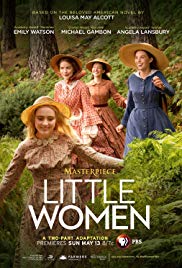
LITTLE WOMEN
UK/US, 2017, 165 minutes, Colour.
Maya Hawke, Kathryn Newton, Dylan Baker, Emily Watson, Willa Fitzgerald, Annes Elwy, Julian Morris, Jonah Hauer- King, Eleanor Methven, Michael Gambon, Angela Lansbury.
Directed by Vanessa Caswill.
Louisa May.Allcott’s novel was very popular at the time of its writing, the American Civil War, and has continued as a favourite, more than its sequel, Good Wives. This is yet another adaptation, some re-ordering of the plot lines, made for television. (In fact, there was another version in 2018, an updating of plot and characters to the 21st century which loses the somewhat elegant sensibility of the period in which it was set, far too modern, almost just another teenage movie.) At the end of 2019, there was a star cast version directed by Greta Gerwig.
Movie audiences had the opportunity to see a cast led by Katherine Hepburn in 1933 version, a cast led by June Allison in 1949 version with all the MGM style.
So, most audiences will be familiar with the novel and other versions and that sets up expectations. A great deal depends on the fidelity of the plot to the original and there have been some criticisms here.
However, the film has quite some strength in the casting, with Maya Hawke- Thurman as the forthright Jo but, especially, with the sensitivity of Emily Watson as Marmee and some good surprises with Dylan Baker as the father, Michael Gambon as Mr Lawrence and, with her long heritage of character roles, Angela Lansbury as Aunt March.
However, this miniseries is just one amongst many versions.
1. The popular classic? Film versions, television versions, modern updates? Comparisons?
2. The 21st-century version, the television, British and American production? Filmed in Ireland? The range of the cast, many British performers as Americans? The effect?
3. Audience familiarity with the story? The March family? The background of the Civil War? Marmee and her goodness, coping with her husband’s absence, Father as a minister, the war? The four daughters? Hannah the maid? The visit to Aunt March? Costumes and decor? Recreation of the period? The musical score?
4. The significance of the Civil War, the presence of African- Americans, Father and his work, John going to war, his being wounded? The shopkeeper, African- American, and his son at war?
5. Father’s absence, his injury, Marmee going to be with him, Meg’s pregnancy? Her return?
6. The tone of the opening, many kisses and giggles, moving to a more serious treatment, the focus on each of the daughters, each personality, differences, ages, relationships? Marmee and his concern about the poor family, giving the Christmas breakfast? Laurie seeing them, talking to Jo, his later gift?
7. Jo as the centre, tomboy, controlled emotions, interactions with her other sisters, her parents? The friendship with Laurie, the conversations? Her writing, going to the play, Amy and her tantrum, burning Jo’s manuscript? Jo and her bitterness, Amy’s forced apology? Later, her bond with Amy? Amy on the ice, everybody saving her including Jo? Jo wanting the trip to Europe, Amy going Instead? Her friendship with Laurie, his love for her over the years?
8. Meg nice, her work as a tutor, working for Aunt March, going to the dance, the attraction to John, his going to the war, his proposal, Aunt March’s reaction, in action, wounded, the wedding, Meg and the pregnancy, the birth of the twins?
9. Beth, young, quiet, at home, getting scarlet fever, her illness, Jo and her concern, taking her to the sea? The interpretation that she was attracted to Laurie? Her accepting her illness, talking with Marmee, her death?
10. Aunt March, Jo Has a companion, Amy taking her place, the visits, her harsh attitude, social snobbery? Laurie, John? Her gift for the wedding? Having a stroke and Jo’s visit? Leaving the house and the orchard to Jo?
11. Jo, her writing, creativity? Her parents and their support? Publishing, getting some money, finance for the family, her going to New York, the encounter with the professor, the philosophical discussions about Kant and Hegel, his encouraging her, her going home, looking after Beth, and the sea, at home, writing the poem, its being published? The professor liking it? His visiting, realising the attraction, having all the children at the estate and working with them? The whole family present?
12. Mr Lawrence, the neighbour, Laurie and his grandfather’s expectations, sending him to Harvard, the visits to the house, the pianos, his response, his friendship?
13. Amy, in Europe, Laurie going to Europe, their travels, sharing, Amy and her art? The return? Laurie and the final talk with Jo? Marrying Amy?
14. Louisa May Alcott as the American equivalent of Jane Austen and her story telling?
Angel of Mine
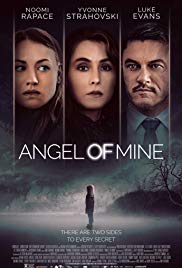
ANGEL OF MINE
Australia, 2019, 97 minutes, Colour.
Noomi Rapace, Yvonne Strahofski, Luke Evans, Richard Roxburgh, Rob Collins, Finn Little, Tracy Mann, Rachel Gordon, Pip Miller, Annika Whiteley.
Directed by Kim Farrant.
This is a strong Australian drama which, initially, some more audiences might think would be better seen on television. But, as the film continues, drawing the audience into the growingly intense development of its plot, they can be pleased that they are watching and focusing on a big screen in the dark.
The director of the film is Kim Farrant (Strangerland) and one of the co-writers is Luke Davies who made such success of a drama about mothers and children, Lion.
And, this is a drama about mothers and children.
The setting is Melbourne, the audience is immersed in suburbia. Lizzie is seen at work, putting on make-up, a beauty consultant at a store. But, the make-up is something of a mask. Gradually, we discover that she is a deeply disturbed woman, many of the details of her situation and her trauma not immediately revealed, the audience having to get to know her, understand her, doubt her, be exasperated with her. She is meeting her estranged husband, Luke Evans, sharing custody with the young son, Thomas (Finn Little, the young boy in the recent remake of Storm Boy). Thomas seems more at home with his father than with his moody mother.
By chance, Lizzie glimpses a seven-year-old girl, the daughter of a family who are about to move to Perth, whose son plays soccer with Thomas. Lizzie takes a picture of the little girl – and the drama moves to a more intense pace.
When the audience learns that Lizzie has lost her young daughter in a fire, we become more and more involved in her obsession, her stalking of the little girl, her belief that this really is her little daughter. If this sounds intriguing, it is well worth following up by watching the film, more and more revelations about Lizzie and her character and suffering, the attempts of her parents to help her, her visits to a psychologist, the tension with her husband.
The other principal character, in fact, is the mother of the little girl, Claire (a strong performance by Yvonne Strahovski), with Richard Roxburgh playing her husband. Claire is friendly with Lizzie, two mothers talking about their sons and Lizzie intimating that she would like to buy the comfortable home, visiting again and again.
One of the puzzles is wondering the nature of Lizzie’s obsession, whether there is any intimation that what she claims could be true. As time goes on, Lizzie intrudes on the family, making Claire both suspicious and angry, building up to a final confrontation between the two women.
In terms of international filmmaking, it is interesting to find Swedish actress, Noomi Rapace (who came to international attention as Elizabeth Solander in the millennium trilogy as The Girl With the Dragon Tattoo). The screenplay indicates that she has a Swedish mother (played by Tracy Mann) and lived in Stockholm for some time, hence her accent in Melbourne.
Given the information that this film is an adaptation of a French film, L’Empreinte? de l’Ange/Mark of an Angel (2008), directed by Safy Nebbou, director of the recent Juliette Binoche drama, Who You Say I Am, and featuring two of France’s leading actresses, Catherine Frot and Sandrine Bonnaire, it would certainly be most interesting to be able to see the original film.
For audiences who appreciate well-written, well-directed, dramas with strong performances, this is well worth watching.
1. The title? Echoes of Baby of Mine? Angels and children?
2. The Melbourne sitting, the remake of the film? The suburbs, homes, schools, shops and malls, psychologists offices, parks? The musical score?
3. The focus on Lizzie, the performance by Noomi Rapace? The Swedish background? The opening, make up, her job? Going to meet Mike, the introduction of Thomas, the tension, the separation and custody papers, outings, at home, Lizzie and her weeping? Her seeing Lola, taking the photograph and cherishing it? The gradual revelation of what had happened, Rosie’s death, the father, the effect, still celebrating her birthday? The psychological consequences, the institution, divorce and custody, at work, the friendship with Alice, the arranging of the date, the awkwardness of the meal, the sexual encounter and her leaving? Encountering Claire, Tom’s playing with Jeremy? The nightmare and her having to rescue Lola from the pool? The continued presence, the skating and the accident, on the side of the stage for the ballet performance? The issue of buying the house, the tour, Lola’s room? The effect, the clashes with clear, her intruding, hiding in the cupboard, the confrontation and fight with Claire? The visits to her parents, their support? The interview with the psychologist and her lying to him? The audience sharing the perception of madness?
4. Did the screenplay indicate to the audience that they should have an inkling that Lizzie was actually telling the truth?
5. Thomas, his age, moods, staying with his father, upset with his mother, playing with Jeremy, the difficulties of Lizzie not picking him up? His decision about his father? Staying with his grandparents?
6. The grandparents, Swedish and English backgrounds, understanding of Lizzie, minding Thomas, the meals? Their believing that she was psychologically upset?
7. Claire, a strong personality, children, the relationship with Bernard, moving to Perth, selling the house, Lizzie and her looking over the house, sharing with Lizzie? The change, seeing Lizzie at the gate, the skating accident, the ballet, contemplating restraining order, Bernard not sharing her anxiety, her being upset about the boat ride, talking with the Lola, the discussion about angels?
8. The going away party, Lizzie arriving, her being ousted, the confrontation with Claire, the fight? The accusation? Claire’s confession, Bernard and the children hearing it? Her rationale, the mother losing a child, audience sympathy?
9. The aftermath, Claire awaiting trial, Lola coming to the house, Jeremy coming in? Mike, the grandparents? What future?
Sun Dogs
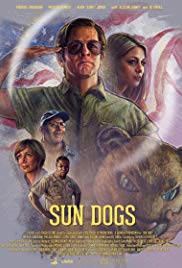
SUN DOGS
US, 2017, 94 minutes, Colour.
Michael Angarano, Melissa Benoist, Ed O' Neill, Alison Janney, Jennifer Morrison, Eric Christian Olson, J.R.Ramirez, Xzibit.
Directed by Jennifer Morrison.
This is an unusual film. It focuses on a character who had brain damage from his birth and lives on the autistic range.
It is 2004. The Bush administration has the war on terror and there is an atmosphere of patriotism. Ned is played by Michael Angarano very effectively. He does all kinds of physical training in order to apply to join the Marines to go to fight in Afghanistan. The authorities are rather patient with him, send him off, telling him he can apply again – until one of the officers has the idea that he could be a Sun Dog, observing terrorists in the community. Ned takes it very seriously, uniform, cards with 100 terrorists photos, his observing suspects…
Ned lives at home, cared for by his mother, Alison Janney, who still has ambitions to do nursing training. Also at home is her partner, Bob, marvellously played by Ed O’ Neill.
Ned attracts the attention of a young girl, Talley (Melissa Bennoist) who is intrigued by Ned and his mission, joins him, photographs him, believes him. Ultimately, Ned has to face the truth and Talley, upset, taunts him and leaves for San Francisco.
The film has elicited a great deal of sympathy for Ned, audiences hoping that he will be helped to come to terms with his life and his patriotic ambitions.
The film was directed by Jennifer Morrison who also appears in the film
1. Title? The invention of a name for undercover agents in society? Ironies?
2. A genial film? A sad film? A challenging film?
3. The setting, the home, workplaces, Marine recruiting centres, airports, spy investigation centres? San Francisco, the ending? The musical score?
4. Ned’s story? A sympathetic young man? Introduction, waking, his room, instant exercises, the run, timing, his mother’s photos, on the wall? Earnest? Travelling on the bus, imagining himself fighting in Afghanistan? The atmosphere of 2004? Patriotism? Osama bin Laden? The interview with the officers, his enthusiasm, salutes, sir? His repeated visits, volunteering, instant? His qualifications, demonstrations? His continued returns?
5. His relationship with his mother, her patience, caring for him, fostering his concern and wanting to do good? Bob, his place in the household, relationship with Ned, father-figure?
6. Rose, Ned and his mental condition? At home? The father disappeared? The many years with Bob? Her patience, yet her desire for something else, to continue her nursing training, her eventually going to New York? The postcards?
7. Bob, age, Vietnam, initial ambitions, truck driving? His injury? The insurance and his having to refrain from active work? At home, reading, supporti of Ned? Father figure? The practicalities, commonsense, his philosophy of doing what you can? His patience with Ned, explanations, going out digging?
8. Talley, her talent for photography, yet unsettled, at the club, propositioning the men, the encounter with Bob, wanting a lift? The encounter with Ned, his charm, his explanations of Sun Dogs, her being caught up, driving him, sharing his enthusiasm, the secrecy, spying on potential terrorists, photographing? Believing Ned?
9. Ned, the officials at the Marine recruiting office, the receptionist and her patience, the two men, listening to Ned, creating the idea of Sun Dogs, Ned and his enthusiasm, uniform, action, filming, giving the information? Eventually going too far, the police at the airport? The officer and his apology, wanting to help Ned but going too far?
10. Talley, her being upset, leaving, taunting Ned about his mental abilities, virginity? A letter from San Francisco and her apology?
11. Ned, the brain difficulties, from birth, autistic range? The typewriter, writing his cards, reading from them, exhortations?
12. Wanting to help people, the idea of going to San Francisco, the bridge, seeing the woman on the bridge and offering her the note? Audience feeling about Ned at this moment of the film’s conclusion?
It: Chapter 2
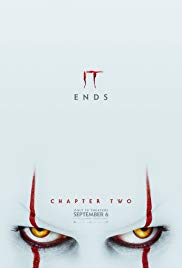
IT: CHAPTER 2
US, 2019, 169 minutes, Colour.
Jessica Chastain, James Mc Avoy, Bill Hader, Isaiah Mustafa, Jay Ryan, James Ransone, Andy Bean, Bill Skarsgaard, Jaeden Martell, Wyatt Oleff, Jack Dylan Grazer, fin walk hard, Sophia Lillis, Chosen Jacobs, Jeremy Ray Taylor, Teach Grant, Nicholas Hamilton, Peter Bogdanovich, Stephen King, Xavier Dolan.
Directed by Andy Muschietti.
This is certainly one for Stephen King fans, not one for those who are not Stephen King fans who may well dislike it. And, it will depend on audience response to the initial It from 2017. (Previously, It had been filmed as a television miniseries.)
The film is set in Stephen King’s state of Maine, the ordinary town of Derry. The previous film informed audiences that every 27 years evil manifests itself in the town, destructive and murderous, embodied in a weird and ghoulish character, Pennywise, a sinister clown figure. In the previous film, a group of youngsters encountered this evil, struggled against it while still struggling with difficult situations and their families. To all intents and purposes, they achieve their mission to destroy It.
However, 27 years have gone by and…
Stephen King sets up weird situations and introduces eccentric characters – as well as a great deal of the macabre, some savage horror, struggles to the death. Fans instantly accept this and are absorbed. Others may find the horror too horrible, an atmosphere of nastiness, and being invited to identify with characters, many of whom one would not want to be friends with.
Now, we have this group aged around 40. One of them has never left Derry and senses the incoming evil, the audience seeing some brutal murders and assaults and the resurrection of Pennywise. He knows that it is time to summon the friends and remind them of the blood pact they made to reunite if the terror manifested itself again.
This is a rather long film. in the early part, after the brutal murder, it spends a great deal of time re-introducing us to the main characters, seven of them, indicating what had happened to them, some successful, others trapped in their past, not exactly memories because they do not remember well, but a sense of evil from the past. And, the film uses the device of reintroducing the characters when they were children, reminding us of what has happened to them, their interactions, the experience of Pennywise.
Which means then that when each of them arrives in the town (although one opts out through suicide), the film spends quite some time following each of them into a re-visiting of their harsh past. And, again, the flashbacks to them as children.
So, finally, they are ready to combat Pennywise in cavernous locations, in physical and ghostly threats, in demands on their courage, in the way that they had done 27 years earlier. Rather repetitious… The experiences are painful, including one death, but there is literal sunshine in Derry after the ordeal.
For film buffs there is a brief appearance by Peter Bogdanovich as a film director and some visual allusions to other Stephen King’s stories, the blood-drenched Carrie, The Shining and the door opening, “here’s Jack�.
1. The popularity of Stephen King’s novels? Screen adaptations? It and television series, the two films? In Stephen King’s canon?
2. Audience expectations? Horror? Mystery? Symbols of evil? Heroism against evil? The state of Maine, towns, locations for horror experience?
3. The town of Derry, in the 1980s, the streets, homes, the drains, caves, old houses, and their being seen in the 21st-century? The atmosphere of the town and its experiences of evil? The musical score?
4. The title, the presence of evil, every 27 years? The background, the circus, the poster and Mr Pennywise? The clown? The reason for evil? The first part and the experiences of the 1980s, the children and the battle against the evil and Pennywise? The second part and the adults? The impact of the juxtaposing of past sequences with the 21st-century?
5. The emphasis on memories, retaining memories, forgetting significant details? The audience remembering the children, their characters, interactions, the struggle with evil, the hauntings? Their own personal lives, their parents, families? School, bullying? Deaths, evil, the final combat? The visualising of their oath to come together should the evil appear again?
6. The film introducing each of the central characters as adults, their lives? Bev and her brutal husband? Ben, fit, his company, controlling the board? William, his actress wife and her criticisms, writing the screenplay, the interaction with the director, people criticising his endings? Richie, nervous, being sick, going on stage, the failure of the joke? Ed, anger, pressures on him, health, the car crash? Michael, remaining in Derry, his investigations, enclosed, sensing the evil, the phone calls and pressurising everyone to come? Stanley, the message, the bath, killing himself, the letter sent, his decision not to interfere with the pact because of his own fears? His death saving them?
7. Manifestations in Derry, the gay men and their being bashed, the body in the river? Other people disappearing? The appearance of Pennywise, his biting his victims?
8. Pennywise, the symbol of horror, vengeance, in the past, with the children, their trying to destroy him? In the present, reappearance, destructive?
9. The group assembling, at the hotel, the discussions, their fears? Michael and his demands? Their agreements?
10. Each of the group going back to their past, to collect their symbols? Bev visiting her old house, the sinister woman and the attack? The poem? Ben, at school, his size, devotion to Bev, hiding in his locker? William, memories of his brother, the notes? And, his mother, his fears, abandoning her? Richie, small, cheeky, the gay implications? Michael, living in the town, his fears? Memories of Stanley and his mother? Each of them experiencing their horrors and the presence of evil? Pennywise?
11. The group combating evil, in the caves, in the drains, remembering their actions in the past, William and his concern about the death of George? In the caves, the pursuit, the damages, blood, pursuits? Injuries? Ed, his fears, Richie encouraging him? His finally vanquishing the monster? But his own death? The humiliation of Pennywise, his shrinking, destruction?
12. The collapse of the building, the group coming out, the town of Derry, the scenes of the fair, the disappearance of the boy in the ghostly ride? Now the fair deserted, the empty streets?
13. The aftermath, Richie and a sense of worth, William and his writing the novel and having better endings? Michael packing and leaving the town? The letter from Stanley? Ben and Ben have and their being together?
14. Another 27 years before the evil comes again?
Dog's Journey, A

A DOG'S JOURNEY
US, 2019, 109 minutes, Colour.
Dennis Quaid, Kathryn Prescott, Marg Helgenberger, Betty Gilpin, Henry Lau, Abby Ryder Fortson, Ian Chen, Emma Volk, Johnny Galecki, Jake Manley, Daniela Barbosa, Conrad Coates. Voice of Josh Gad.
Directed by Gail Mancuso.
Reincanine action. This wordplay was a tantalising distraction while watching yet another of adaptations of novels by W.Bruce Cameron, his entering into the psyche of dogs, voicing their thoughts and feelings, making them central characters. He did it some years ago with A Dog’s Purpose and there is also a 2019 film, A Dog’s Way Home – all with screenwriting collaboration with Cameron.
For those who are not dog lovers, this canine exuberance as well as the canine reincarnation, might prove something of a chore. While the dogs are personalised, all of them voiced, as in the previous film, by Josh Gad, a variety of voices and tones, their dialogue is from the dog’s point of view, hearing the human speech but not really understanding what they are getting at, the dog learning to interpret. This means that the screenplay is a rather “cute� in dramatising the dog’s thinking, feeling and instinctive behaviour.
This film also introduces characters from the past, older farmer, Ethan, and his wife Hannah. Dennis Quaid appears again and Hannah this time is Marg Helgenberger. The film dog, Bailey, also reappears. But, this time, there is a story of Ethan and Hanna’s family, their son killed in a car accident, their taking care of their granddaughter, CJ, but her self-absorbed grieving and angry mother, Gloria (Betty Gilpin) resents them and takes CJ off.
In fact, CJ (Kathryn Prescott) becomes the central character, seen as a little girl of 10 with her friend, Trent, planning to adopt two dogs, one of whom, Molly, is a reincarnation of Bailey who has promised Ethan that he will look after CJ. Poor CJ, her mother becoming more self-absorbed, drinking, fickle boyfriends, neglecting her daughter. As CJ grows up, she gets entangled with a local boy who is into drugs which leads to a car crash.
There is, of course, more, Bailey becoming a literal Big Dog and a chance encounter with CJ. But, finally in New York City, matters come to quite a dramatic head, Bailey this time a little dog, somewhat ferocious, called Max. Needless to say he and CJ coincide – and they do with Trent (Henry LaU), who is, perhaps, the most sympathetic character in the film.
A lot of sadness, a lot of joy and recovery, and, happily, everybody ending back at the farm where it all began.
While the film could well delight a lot of younger audiences who love dogs, this time there are some rather emotional adult themes which they may or may not understand or appreciate.
1. The popularity of the books by W. Bruce Cameron? The film adaptations? His cowriting the screenplays?
2. Audience enjoyment of films about dogs? Dogs as central characters? The voices for the different dogs? Josh Gad and his talent for the different voices? The dog and its own life, feelings and perspectives, desires? Its interpretation of human words? Human behaviour?
3. The title, the journey of the dog, reincarnation?
4. Bailey, the introduction, size, age, on the farm, relationship with Ethan and Hannah? Leaping over Ethan’s back and catching the ball? The devotion to CJ? Dislike of Gloria? The disappointment of Gloria taking CJ? Bailey’s promise to look after CJ – leading to the success of lives? (Audience knowledge of Ethan and Hannah and Bailey from the previous film and its story of reincarnations?)
5. Ethan and Hannah, happy grandparents, on the farm, trying to deal with Gloria, the death of their son? Her taking CJ away? Later coming to visit with the gift of Henry’s letters? Gloria turning away, not seeing CJ? The reappearance at the end, elderly, CJ coming to visit with Trent? The little dog, Max? And the leap over Ethan’s back? And a happy ending?
6. CJ, the little girl, with her grandparents, very happy, resisting her mother? After some years, aged 10, the friendship with Trent? Each getting the dog, his severe parents, CJ deceiving her mother, the discovery, being allowed to keep the dog? The two dogs playing together? Gloria, the men in her life, her drinking, self-absorbed, the neglect of affection for CJ? CJ and her delight with Molly? The years passing, Molly learning to sniff out cancer in patients? The training? CJ, the attraction to Shane, neglecting Trent? Going to the party, the drugs, the arrest, her community service? Her confrontation with her mother, the revelation that her mother had spent all the inheritance for her college education? CJ taking the car? Going to New York, to write songs and music?
7. Molly, the transition to Big Dog? With Joe at the Quick Stop? CJ stopping, buying things, Big Dog and being friendly with her? Her driving away?
8. Big Dog, death, transition to Max? Max, aggressive, not able to be adopted? The encounter with CJ, Max always sensing the presence of CJ? CJ and her boyfriend, the dog and the antipathy, tormenting the boyfriend, his leaving? The chance meeting with Trent after all the years? His being successful, business, in London, returning to New York, his girlfriend? Max and the discernment of cancer, Trent going to the doctor, the diagnosis, his girlfriend and her jealousy, but her unwillingness to nurse Trent? The chemotherapy, CJ as a good friend, Max and support? The good news about the cancer clearing?
9. CJ, her songs, the visit from her mother, her mother’s apology, AA, giving her daughter the letters? CJ reading them? Trent agreeing with Gloria about CJ and stage fright? Urging her to try, at the club, her success?
10. The decision to visit her grandparents, her mother having bad mouthed them? The happy visit? Ethan realising that Max was Bailey returning? The leap over the back? CJ’s realisation of her relationship with Trent? Max urging them to kiss?
11. Marriage, pregnancy, Gloria and her grandchild, the great-grandparents, Ethan and his death, the funeral? The end of an era – but, the possibilities of all kinds of reincarnation?
Blind Christ, The/ El Cristo Ciego
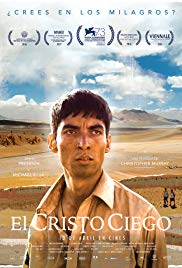
EL CRISTO CIEGO/ THE BLIND CHRIST
Chile, 2016, 85 minutes, Colour.
Michael Silva.
Directed by Christopher Murray.
Who is Jesus Christ? Where is he in the world today? In the churches? In people who resemble him in his mission, in Christ figures? These are some of the questions that this film raises.
This is a brief film, something of a contemporary probing of faith, touches of mysticism, a yearning for miracles and healing.
It is a Chilean story, set in the countryside, in poor villages, some of them exploited by mining companies who drain rivers of water, in abandoned churches, outside prisons.
The central character is Michael, who feels that he is something of a prophet, that God is within him, that he is something like Christ in the 21st-century, urging a young boy, nails hammered into his hand, to pray, exiled by his father but walking, barefoot, through the desert encountering people whom he might help and heal. Help he does but he fails in healing, especially in his quest to meet an old friend who has come out of prison.
Michael is denounced mockingly as a prophet but also gains quite a following who believe in him, especially the women whom he tries to help. There are attacks on organised religion, on organised Catholicism, priests abandoning parishes the years, criticisms that Michael should not baptise…
This film is not one for conclusions but rather for opening up issues and questions about the nature of faith, organised religion, faith in the heart, the possibility for miracles, the possibility for ordinary and everyday life healing.
1. The title? Expectations? The presence of Jesus in the contemporary world? Christ figure?
2. The Chilean locations, towns and villages, homes, shops, churches, the open spaces? The desert scenery, dry rivers? The musical score? Religious overtones?
3. The pace of the film, audiences drawn into the life of the peasants, the religious dimensions, the touch of the mystical, the miraculous, issues of faith and grace? The slow revelation of Michael, his being another Christ, issues of faith and miracles, disappointments, disillusionments? A Christ figure?
4. The initial tone, the young boy, nails in his hands, his praying in the desert, his collapse?
5. Michael, the boy and the nails, his going home, the clashes with his father, his seeing himself as a healer, going on the mission to find his old friend and to heal him?
6. Michael as a character, his age, peasant background, religious background, moving away from church and religiosity, interior faith? His travels, the various villages? His telling parable stories and their being visualised?
7. His father exiling him, no shoes, walking the desert? The range of encounters? His attempts at healing? The people and their expectations, following him? His care of the old woman? The little girl praising him and inviting him to heal? The old men, the guardians of the church? The peasant woman, her gratitude, the sexual encounter and its effect on him?
8. People commenting in on him as a prophet, insult, praise? His own sense of God, faith, of mission, a feeling, despite failures?
9. The old man, his years in prison, his violence, the priest asking him to care for the church, the priest’s disappearance and not returning?
10. Episodes in the church, the children for a baptism, whether he should baptise on not, the old man coming to forbid him and his telling stories about healing and repentance?
11. Eventually meeting his friend, his sad story, the past visits to the home, the mine, losing his job, the life of crime and stealing, prison, his health? The bond between Michael and him? The ritual, his lying on the bed, Michael massaging his feet? But no recovery? And the man not worried about this but grateful for the friendship, affirmation?
12. Michael returning home, his father receiving him? And the puzzle about what he was to do with his future life?
Weathering With You
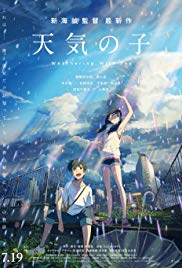
WEATHERING WITH YOU
Japan, 2019, 111 minutes, Colour.
Directed by Makoto Shinkai.
In recent decades, Japanese animated films, Japanese anime, have become more and more popular all around the world. Many Japanese directors and studios have admirers. The director of Weathering With You, Makoto Shinkai, is on the way up, with acclaim for this film and his previous film, Your Name.
Audiences will admire the animation, the characters, certainly, but more for the extensive backgrounds, a portrait of Tokyo, overviews and neighbourhood details, as well as characters being taken up into the sky, all the swirl of clouds and rain.
For those who admired Your Name, there are quite some thematic similarities here. Both are concerned with a boy and a girl, the relationship, years passing, timeshifting, love and rescue.
The title, of course, is unusual. The central character is the young Hodako, running away from home to Tokyo, getting a job investigating stories and urban legends, encountering a girl,Hini, who seems to have some kind of mystic control of the weather. And the weather, in this case, is continual rain.
The two have some adventures, even to exploiting Hini’s weather predictions but, she disappears, into the sky, into the cosmos – which gives permission for Hidako to go on a mission to find and to rescue.
On the one hand, Hidako’s story is initially rather mundane. On the other hand, he gets caught up in a somewhat mystical world that he does not understand.
There are overtones of global warming in this story of continued rain with scenes of the literal sinking of the city of Tokyo.
Weathering with you certainly must go on the list of must see Japanese animation films.
1. The world popularity of Japanese anime films? Animation? Narratives? Visual style and score?
2. The impact of the animation, the human characters, the background, the city of Tokyo, the cosmic elements in the sky and the weather? Action? The special effects?
3. The reputation of the director? His success with Your Name? The similarities with this film, the two protagonists and the relationship? Struggles? Resolution?
4. The focus of the weather, the visualising of the rain, the clouds? The unseasonable rain? The downpours on Tokyo? The glimpses of sun?
The effect of the water, the sinking of the city and the visualising of this, the emotional consequences for the Japanese audience, for others?
5. The story of Hokado and Hina? Young teenagers? Their lives intersecting? The bond between them? Love, crises, rescue?
6. Hokado’s story, his age, leaving home, his parents filing a search for him? Into the city, the rain, almost drowning, the rescue, the card from the employer, his later going to the office, his work on urban legends? Working with Natsui? The encounter with Hina, attracted, her work at the diner, the free meal, the younger brother? The police concerned about him and custody? Hokado and his rescuing Hina, the struggle, her gratitude towards him?
7. Hina, the rain, the sunlight, the prayer, her power over the weather, the explanation from the priest? With Hokado, the possibility of a business, altering the weather for people’s functions?
8. Hina, her disappearance, taken up into the clouds?
9. Hokado, Hina’s disappearance, his being sacked from his job? His continued search? The police and their suspicions, the pursuit? His employer, pursuing, then saving him from the police? The other helpers, the bike ride from Natsui?
10. The cosmic element, Hokado and his search, caught up in the clouds, the visual impact of this cosmic experience, finding Hina? Her dilemma? Responsibility for the weather?
11. The fine weather, the surprise, people’s reactions?
12. The return to earth, Hokado to his village, finishing his studies? Wanting to go back to Tokyo and finding Hina? And the continuing rain?
Beyond the Known World
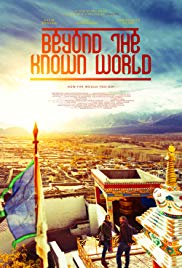
BEYOND THE KNOWN-WORLD
New Zealand/India, 2016, 102 minutes, Colour.
David Wenham, Sia Trokenheim, Emmanuelle Beart, Chelsie Preston Crayford, Emily Mc Kenzie.
Directed by Pan Nalin.
This is a New Zealand/ India coproduction, the director coming from India. The basic story comes from New Zealand, an ordinary couple, their daughter travelling away from home, disappearing, the parents going on a quest to India to find her. The couple is played by David Wenham and Sia Trokenheim.
The Indian contribution is the continued range of urban sequences, crowded cities, along with beautiful and exotic countryside, especially in the high mountain ranges.
The couple get official help in tracking down their daughter, print photos of her which they hold in the marketplaces, get some responses, some charlatans included. The main contacts are with similar young people travelling away from home, a freer life, drugtaking, living in communes. The young people are often hostile to the adult generation, refusing to give information, misleading.
The cooperative person is Louise, played by Emmanuelle Beart, who left home long ago, is out of contact with her family, but sympathetic to the couple.
Eventually, they find leads which lead them into the mountains, seeing their daughter riding with local tribesman, looking back – but not intending to return with her parents, finding a different life of her own.
1. A New Zealand/ India co-production? New Zealand story? Indian locations and atmosphere?
2. The title, exotic India and travellers and pilgrims, their search? Beyond the normal life? In the mountains and life of India?
3. New Zealand story, universal, at the airport, the separated parents, their daughter’s not arriving? Communications, concerned? Her age, growing up in New Zealand, travelled to India, taking money out of the bank, disappearing? The parents and their characters, Carl as hard and demanding, Julie finding him too hard? The decision to go to India?
4. The New Zealand perspective on India? So different from the Western world? Carl and his expectations, hard, judgements on Indians and their customs, demanding? Julie and her acceptance? Some further bonding between the two?
5. Travel in India, leads, further into the interior?
6. The young travellers, away from home, drugs, different lifestyle, religious and/or mystical dimensions? Travelling together, communes? The different nationalities? Hostile and preserving secrets? The different personalities?
7. Carl and Julie, the police, seeing money handed over, Carl and the issue of bribes? The printing of the photo, in the marketplaces, with the photos, different attempts to lead them on, fortunetellers, exploiters?
8. The encounter with Louise, her background, her time in India, separation from family, helping the couple, her contribution?
9. The young woman, arrested for drugs, her hostility, Carl trying to help, interrogations, her eventually giving information?
10. Going further into the mountains, the trek, the explanations about the money, the disappearance, Eva and her relationship with her parents, critical of her father?
11. The couple, seeing the tribesman, riding through the mountains, Eva with them her turning to look, her decision, staying in India, not returning with her parents?
12. A variation on the theme of the next generation alienated with their way of life, with their parents and expectations and demands – and finding a future in distant cultures like India?